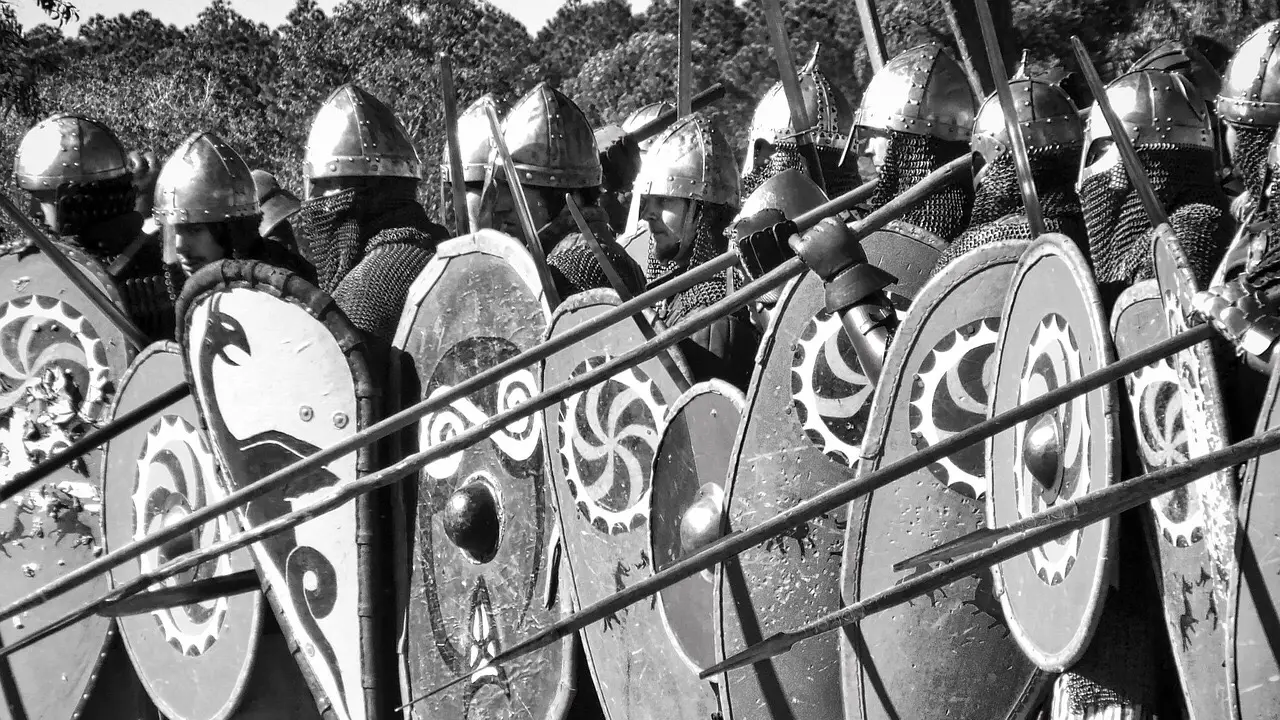By Timothy Young
After I had been stricken for many days, I laid down in the shadow of a rock and fell into a restless sleep. I had slept here before, but it had been some time ago.
As I slept, I dreamt of a fair country, or it seemed fair at first. Then I realized that something was wrong with my vision. From the high perch through which I viewed this fair-looking country, I saw two armies approaching one another. From one teamed hordes of evil: dragons, goblins, giants, and loathsome men corrupted by outside forces, but also their own innate evil. Above their camp floated pennons of all colors, some as black as the heart of their leader, others red like the blood that these fiends were intent on shedding, some of purple and other rich colors alluding to nobility and wealth, and even a host of white banners that resembled the other camp’s banner—except these were stained with filth or torn and shredded.
The other camp displayed a single white banner, so pure that it seemed as if it were freshly bleached, even though it had been there from ages past.
I began to make comparisons of numbers, but the numbers were such as to defy computation, and I decided to take a closer look. My eyes were drawn to the side that had but one banner, as they appeared smaller in number, and I wished to know how they encouraged themselves.
A band of them formed themselves into a small company near the enemy, which appeared to be, for the moment, forgotten by both sides. I noticed that both sexes were represented rather equally. They all sat or stood around a small campfire that flickered weakly in the evening light. Nothing was cooking in that fire, and stranger still for soldiers, none acted hungry.
I surveyed the company and noted that many of the soldiers were only partially armored, though all wore helmets, regardless of their other pieces. To my surprise, I noticed, as though they had just appeared, a nearly equal number of enemy soldiers lounging around the same fire. I wondered why none could recognize their heinous, crooked features, see the black smoke pouring from their faces, or perceive the rattling of their rock-hard hearts in their blackened chests.
It became harder to discern between the army of the single banner and those of the horde. Then suddenly I was among them, and I could not tell on which side my fellows were.
Perturbed, I went back to viewing the soldiers and happily recalled my earlier deduction that all my compatriots wore helmets. But that could not be right, could it? Look at that fine man, with his venerable beard reaching to his waist, a look of iron upon his open face! What about that young man over there, with his piercing blue eyes and intelligent face? Surely that girl, who looked so honest, could not be a spy for the enemy, could she?
The helmets disappeared as well, and I was now without aid of being able to tell them apart at all.
A stranger in a torn military robe, with unkempt hair and fire in his eyes, walked into the camp. “I proclaim the orders of King Shaddai and his son, Prince Emanuel. You are to find those oppressed by Diabolus and free them! Those who are sick, you are to aid! The downtrodden are to be released! The lost you are to find!”
The crowd looked upon him languidly and one of the men in the back—I could not recall if he had a helmet or not—asked, “But what about the enemy? They are more numerous than us! And they have won great victories! How can we overcome them?”
“What is your name?”
The man replied, “Uncertainty.” (It was the custom of the people in those parts not to reveal their names in so succinct a fashion, but rather to imply it as if to confuse their fellows. However, I have recorded only the translations.)
“Draw your sword, look upon it!” the man in the well-worn armor said.
Uncertainty did so, and I watched in fascination as his face gradually changed and a glow came into his shield. His breastplate seemed to repair a dent or two, and he shifted from his sitting position to his feet.
While this was happening, the man in the well-worn armor was stirring the company like a good drill sergeant, chastising some for their poorly-treated swords, their dimmed breastplates, and their unshod feet.
I saw this was a very persistent problem, which confounded me. The ground was covered in quicksand, pools of poisoned water, thorns, rocks, and vile serpents. The shoes, though, seemed perfectly designed for protection, yet only four or five men wore them.
The man in the well-worn armor repeatedly demonstrated various techniques of swordsmanship—mostly defensive, although a few offensive maneuvers were taught as well. He, unlike some of the sergeants in other groups, stuck to what was practical and tried to avoid teaching techniques that were not useful. Discussion was tolerated, if it was practical, but otherwise not.
“Today I sense that we will march on the enemy. King Shaddai will come with his mighty legions, no longer offering mercy, but to give judgment. For now, though, his mercy is offered to all mankind.”
“Judgment? Why can he not simply make peace? Is not Diabolus simply another king?” Much Talk asked briefly—a rare occurrence for her.
The man in the well-worn armor sighed and gently touched her with his sword as he muttered, “Your helmet is not pressing you too tightly, I hope? No! He will not make peace! Diabolus is a traitor and a rebel! He is the reason why there is war!”
“Keep that sword back! It hurts!”
The man in the well-worn armor turned and said to the crowd, “Gird every man his sword upon his side, and let us go forward and do the King’s will!”
“Excuse me. Can I ask something?” interrupted a handsome young man, well-dressed but unarmored except for maybe his helmet. He called himself Scholar, but I suspected he slurred his name as he spoke and meant Coward.
“Yes?”
“As I stood near the edge of the camp, I saw a great giant covered in scales and hair proclaiming that our swords are so weak in quality that he could snap them with his toes.”
“Propaganda.”
“But the learned men are standing with him, even chanting it with him.”
“Their bread is derived from the giant. Unless their chains are cut, they will agree with him. Moreover, the seals of Prince Emanuel are in these blades.”
The young man was not pleased with the answer. “All right. But what about Sergeant Compromise of the company to our left? Does he not say that the handles are defective, prone to breaking if looked at with light? And has not my Lord Antinomian said that the points of our swords are dull?”
“My Lord Antinomian! The man was made a pauper, and his honors rescinded after he betrayed his Prince! And what of Sergeant Compromise? He has never drawn his sword except to salute! Prince Emanuel himself used a regulation sword, which in his day was shorter, but the handle was precisely the same! If it was good enough for him in dueling Diabolus, then I think we can take his word over a lowly sergeant, can we not?”
A young girl asked, “A soldier in the enemy ranks told me that we don’t have weapons. She said, ‘You freaks think you have the sword of a great King! But there is no great King!’ ”
“Draw your sword, my daughter!”
The girl drew and held the sword in the air. She frowned before saying, “Why does it hurt to hold the handle, father? Does it stop with time?”
“No. It is painful realizing how we appear to the King! At times, we cannot bear it.”
A trumpet blew in the distance and the man in the well-worn armor said, “The Prince may be returning! Let us go and fulfill his command!”
I was startled by the commotion of rejection to this order. Some stood and announced that they were leaving to join companies where there was a real sergeant. Others sat down and declared that they would guard the camp. A few claimed that they would love to come, but that they had no knowledge of how to fight in the open field. Others earnestly looked around, but finally sat, insisting that they could not fight in their shoes because they had heard that the ground had a new covering of rocks. Others glanced at their armor, and in shame sat down.
“Who will come with me?”
“I will,” an elderly man said, shouldering his towering shield and hobbling over to the sergeant.
“And I!” exclaimed a boy so young that I almost questioned the recruitment policies of this army.
“After being rescued from the camps by the Prince, how could I do otherwise?” a man of rough complexion said slowly as he drew his sword and gazed toward a hill that was barely visible in the twilight.
“Father, is it right for me to come?” the girl asked nervously.
“Yes, all of the King’s subjects are commanded.”
“Then I will go.”
“Son of Faithful, will you come?”
A short man stood and nervously joined the others.
“My husband is coming, I will come too!” his wife said as she stepped forward into the small group.
“Will no one else come?”
I felt compelled to stand and come, but they could not see me. In something akin to despair, the man in the well-worn armor turned and marched toward the foe, yet his face was set like flint toward Destruction. The City of Destruction.
 The previous story was written by a strange character by the name of Timothy Young. He is a middle child, was a homeschooler, and will be a published author, if he has his way. He currently is studying in the Bible Institute of South Africa. He is a Christian, and a missionary kid. He enjoys sword-fighting, writing, reading, and pestering people. He is not entirely sold on the concept of editing, which may explain any mistakes that you may see in his works. Should you happen to meet him (which is unlikely unless you are in Cape Town, South Africa), you most likely will hear him quote whatever he has just been reading until you are bored to tears.
The previous story was written by a strange character by the name of Timothy Young. He is a middle child, was a homeschooler, and will be a published author, if he has his way. He currently is studying in the Bible Institute of South Africa. He is a Christian, and a missionary kid. He enjoys sword-fighting, writing, reading, and pestering people. He is not entirely sold on the concept of editing, which may explain any mistakes that you may see in his works. Should you happen to meet him (which is unlikely unless you are in Cape Town, South Africa), you most likely will hear him quote whatever he has just been reading until you are bored to tears.


I like this! 🙂 Great job, Timothy. Say, have you ever read The Call or The Final Quest by Rick Joyner? It’s very similar, except it was an actual vision, not just an allegory.
No I haven’t actually. Cool though. 🙂
Ooh… this reminds me of Pilgrims Progress, only better done stylistically speaking. 😉 I really like it. Good work, Timothy.
Love the allegory here! Of course, I’m a sucker for medieval anything. Great job, Timothy! 😀 Keep writing for the Kingdom!
Brilliant! I love it! 🙂